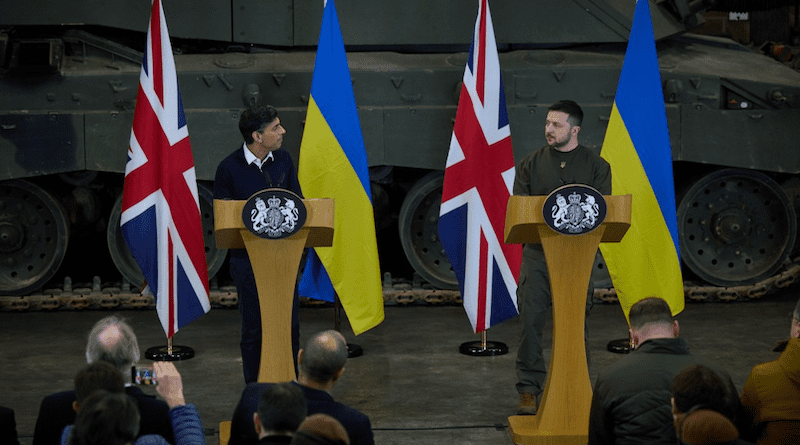How The Ukraine War Put The ‘Great’ Back In Britain – OpEd
By Arab News
By Luke Coffey*
President Volodymyr Zelensky traveled to the UK last week and delivered a powerful speech to a rare joint session of Parliament in Westminster Hall.
This was a historic speech in a historic location. Westminster Hall, the oldest existing part of the Palace of Westminster in London was completed in 1097 — at a time when, more than 2,000 kilometers to the east, Kyiv was a thriving city on the Dnipro River at the heart of a powerful state and Moscow was still only a forest.
That Zelensky’s first stop on his first official visit to Europe, and only his second outside Ukraine since the war started, was London — and not Berlin, Paris, or Brussels — is telling. For years, critics of the UK leaving the EU argued that Brexit would diminish Britain’s role in Europe. That Zelensky made his first visit to London tells you all you need to know about how Brexit has affected Britain’s role and influence on the continent.
From the very beginning of the war, the UK has led Europe in supporting Ukraine. As Zelenskyy said in his speech: “London has stood with Kyiv from day one. From the first seconds and minutes of the full-scale war, Great Britain extended its helping hand when the world had not yet come to understand how to act.”
He is right.
This time last year, before the invasion, when European countries were debating whether to send weapons to Ukraine, the Royal Air Force was already delivering arms to Kyiv. The UK implemented its first round of economic sanctions against Russia well before the EU did. Last summer the UK was the first to start a large-scale training program for Ukrainian recruits. Last month the EU finally began its training mission. A few weeks ago, when another debate was taking place across Europe over whether to send tanks to Ukraine, the UK had already declared plans to send 14 Challenger tanks. And last week the UK said it wouldstart training Ukrainian pilots to fly British fighter jets. Time after time, the UK has led the way when it comes to supporting Ukraine.
The UK’s membership status in the EU has nothing to do with London’s historic role in European security. For example, British troops were in Estonia in 1920 helping them to win their independence during the Russian Civil War, before the idea of the EU had even been imagined. When the UK left the EU a century later in 2020, Britain had 900 soldiers there again defending Estonia’s independence. Immediately after Russia’s invasion of Ukraine last February, the UK temporarily doubled the number of troops it had in Estonia. The UK also maintains a small number of troops in Poland as part of NATO’s defense plans.
British leadership does not stop in Europe. Take the issue of free trade. Signing bilateral trade agreements was impossible for the UK while it remained in the EU, as this is a policy competency reserved for Brussels. Now that the UK can reach its own trade deals, London has become one of the loudest voices in support of free trade around the world —at a time when populist politicians in many countries are promoting anti-trade and protectionist economic policies.
Since leaving the EU, the UK has signed trade agreements with 71 countries plus the EU itself. Last year the UK exported £800 billion in goods and services to the world. In the spirit of Adam Smith, there is an ambitious “Race to a Trillion” goal to export more than £1 trillion to the rest of the world by 2030. As the world still reels from the economic consequences of the coronavirus pandemic, more global trade is needed.
The UK has many global advantages. After all, it is the world’s fifth largest economy and is the number one destination for foreign investment in Europe. It is a member of the 53-nation Commonwealth, the North Atlantic Treaty Organization, and the Five Power Defence Arrangements with Australia, New Zealand, Malaysia, and Singapore. The UK holds a permanent seat at the UN Security Council and maintains a “special relationship” with the US. Britain has one of the most capable militaries in the world and has the political will to use that military. The UK also possesses nuclear weapons. It is hard to believe that anyone could ever believe that Britain’s role in Europe is linked to its membership status in the EU.
Russia’s campaign against Ukraine has served as a wakeup call across Europe for many reasons. Defense spending should have been a higher priority instead of years of cuts. Europe had become overly reliant on one major source for its oil and gas. However, the war in Ukraine, and the UK’s response to it, should once and for all relieve any anxieties some may have had about Britain’s role in Europe after Brexit.
The UK is a major European power; always has been, and always will be.
• Luke Coffey is a senior fellow at the Hudson Institute. Twitter: @LukeDCoffey

